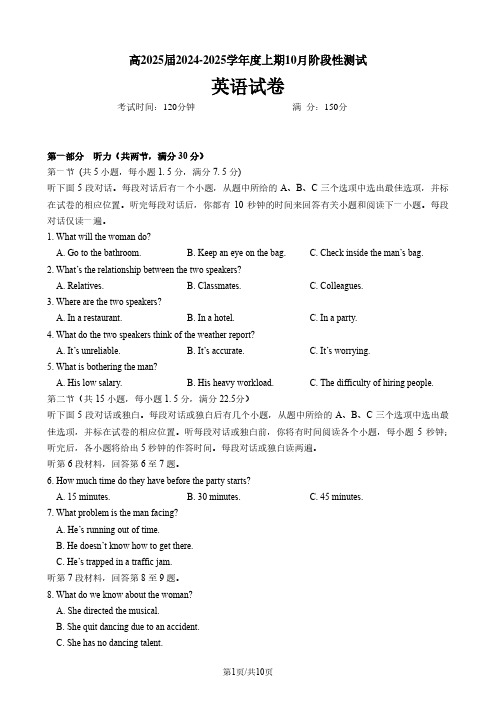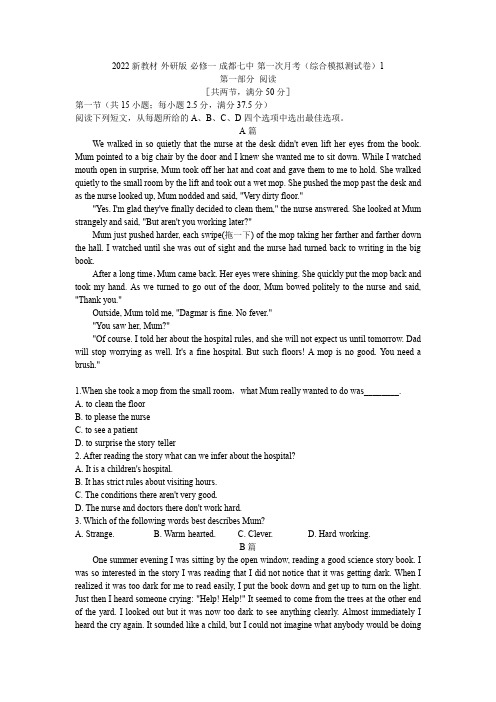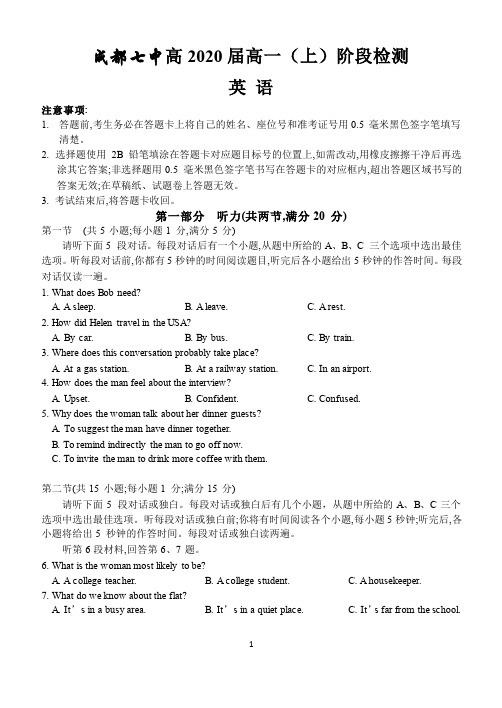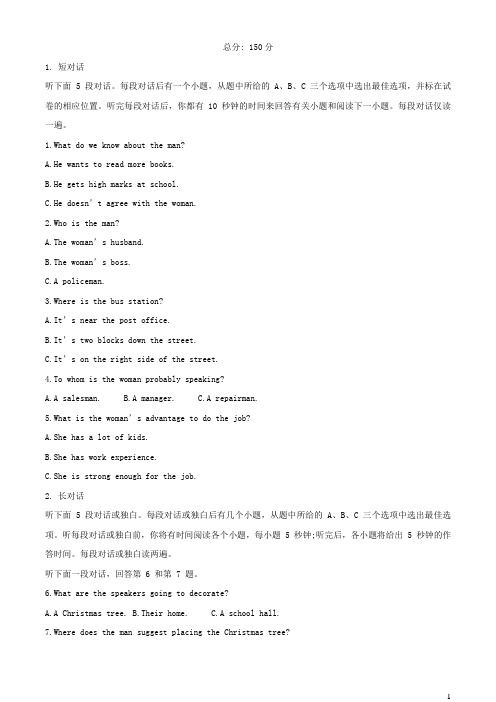成都市2022届七中林荫高一上学期10月月考英语试卷【精校版】
四川省成都市第七中学2024-2025学年高三上学期10月月考英语试题含答案

高2025届2024-2025学年度上期10月阶段性测试英语试卷考试时间:120分钟满分:150分第一部分听力(共两节,满分30分)第一节(共5小题,每小题1. 5分,满分7. 5分)听下面5段对话。
每段对话后有一个小题,从题中所给的A、B、C三个选项中选出最佳选项,并标在试卷的相应位置。
听完每段对话后,你都有10秒钟的时间来回答有关小题和阅读下一小题。
每段对话仅读一遍。
1.What will the woman do?A.Go to the bathroom.B.Keep an eye on the bag.C.Check inside the man’s bag.2.What’s the relationship between the two speakers?A.Relatives.B.Classmates.C.Colleagues.3.Where are the two speakers?A.In a restaurant.B.In a hotel.C.In a party.4.What do the two speakers think of the weather report?A.It’s unreliable.B.It’s accurate.C.It’s worrying.5.What is bothering the man?A.His low salary.B.His heavy workload.C.The difficulty of hiring people.第二节(共15小题,每小题1. 5分,满分22.5分)听下面5段对话或独白。
每段对话或独白后有几个小题,从题中所给的A、B、C三个选项中选出最佳选项,并标在试卷的相应位置。
听每段对话或独白前,你将有时间阅读各个小题,每小题5秒钟;听完后,各小题将给出5秒钟的作答时间。
每段对话或独白读两遍。
听第6段材料,回答第6至7题。
四川省成都市第七中学2022-2023学年高三上学期10月阶段考试 英语

高2023届10月阶段检测卷英语考试时间:120分钟满分:150分注意事项:1.答卷前,考生务必将自己的姓名、准考证号填写在答题卡和试卷指定位置上。
2.回答选择题时,选出每小题答案后,用铅笔把答题卡上对应题目的答案标号涂黑。
如需改动,用橡皮擦干净后,再选涂其他答案标号。
回答非选择题时,将答案写在答题卡上,写在本试卷上无效。
3.考试结束后,请将答题卡交回。
第一部分听力(共两节,满分30分)第一节(共5小题;每小题1.5分,满分7.5分)听下面5段对话。
每段对话后有一个小题,从题中所给的A、B、C三个选项中选出最佳选项,并标在试卷的相应位置。
听完每段对话后,你都有10秒钟的时间来回答有关小题和阅读下一小题。
每段对话仅读一遍。
1.Wheredoestheconversationprobablytakeplace?A.Atazoo.B.Inalibrary.C.Inadrugstore.2.Whatwillthemandonext?A.Changesomemoney.B.Takethefoodhome.C.Sitandeathismeal.3.Whatdoesthewomansuggest?A.Buyingacomputer.B.Hiringanassistant.C.Startingabusiness.4.Whatarethespeakerstalkingabout?A.Theweather.B.Thescenery.C.Thetraffic.5.Whendidthemanseethefilm?A.OnWednesday.B.OnThursday.C.OnSaturday.第二节(共15小题;每小题1.5分,满分22.5分)听下面5段对话或独白。
每段对话或独白后有几个小题,从题中所给的A、B、C三个选项中选出最佳选项,并标在试卷的相应位置。
听每段对话或独白前,你将有时间阅读各个小题,每小题5秒钟;听完后,各小题将给出5秒钟的作答时间。
四川省成都市某中学高三英语上学期10月月考试题

成都七中实验学校高三上期十月月考英语试题本试卷分第Ⅰ卷(选择题)和第Ⅱ卷(非选择题)两部分。
考试结束后,将本试卷和答题卡一并交回。
第Ⅰ卷(选择题100分)注意事项:1. 答第Ⅰ卷前,考生务必将自己的姓名、准考证号填写在答题卡上。
2. 选出每小题答案后,用铅笔把答题卡上对应题目的答案标号涂黑。
如需改动,用橡皮擦干净后,再选涂其他答案标号。
不能答在本试卷上,否则无效。
第一部分听力(共两节,满分30分)第一节(共5小题;每小题1.5分,满分7.5分)听下面5段对话。
每段对话后有一个小题,从题中所给的A、B、C三个选项中选出最佳选项,并标在试卷的相应位置。
听完每段对话后,你都有10秒钟的时间来回答有关小题和阅读下一小题。
每段对话仅读一遍。
1.Where does the dialogue probably take place?A.On the seaside.B.At the hotel. C.In the restaurant.2.What’s the probable relationship between the two speakers?A.Brother and sister. B.Husband and wife. C.Classmates.3. What does the girl mean?A.Mr. Walmsley is very kind.B. The boy doesn’t need to worry.C. She likes Mr. Walmsley.4.What time did the plane leave?A.At 11:15.B.At 11:05.C .At 11:25.5.What do we learn from this conversation?A.The girl went to New Zealand during Christmas.B.The girl went to visit her uncle during her summer holidays.C.The girl liked the weather in New Zealand.第二节(共15小题;每小题1.5分,满分22.5分)听下面5段对话或独白。
成都七中2022届高一英语10月阶段性考试试卷

成都七中高2022 届高一上期阶段性测试英语试题考试时间120分钟注意事项:1.答卷前,考生务必将自己的姓名、准考证号填写在答题卡上。
2.回答选择题时,选出每小题答案后,用铅笔把答题卡上对应题目的答案标号涂黑。
如需改动,用橡皮擦干净后,再选涂其他答案标号。
回答非选择题时,将答案写在答题卡上,写在本试卷上无效。
3.考试结束后,将答题卡交回。
第一部分听力(共两节,满分30分)第一节 (共5小题;每小题1.5分,满分7.5分)听下面5段对话。
每段对话后有一个小题,从题中所给的A、B、C三个选项中选出最佳选项。
听完每段对话后,你都有10秒钟的时间来回答有关小题和阅读下一小题。
每段对话仅读一遍。
1.Where does this conversation take place?A. In a classroom.B. In a hospital.C. In a museum.2.What does Jack want to do?A. Take fitness classes.B. Buy a pair of gym shoes.C. Change his work schedule.3.What are the speakers talking about?A. What to drink.B. Where to meet.C. When to leave.4.What is the relationship between the speakers?A. Colleagues.B. Classmates.C. Strangers.5.Why is Emily mentioned in the conversation?A. She might want a ticket.B. She is looking for the man.C. She has an extra ticket.第二节(共15小题;每小题1.5分,满分22.5分)听下面5段对话或独白。
四川省成都市第七中学2022-2023学年高一上学期第一次月考英语试卷

2022新教材-外研版-必修一-成都七中-第一次月考(综合模拟测试卷)1第一部分阅读[共两节,满分50分]第一节(共15小题;每小题2.5分,满分37.5分)阅读下列短文,从每题所给的A、B、C、D四个选项中选出最佳选项。
A篇We walked in so quietly that the nurse at the desk didn't even lift her eyes from the book. Mum pointed to a big chair by the door and I knew she wanted me to sit down. While I watched mouth open in surprise, Mum took off her hat and coat and gave them to me to hold. She walked quietly to the small room by the lift and took out a wet mop. She pushed the mop past the desk and as the nurse looked up, Mum nodded and said, "Very dirty floor.""Yes. I'm glad they've finally decided to clean them," the nurse answered. She looked at Mum strangely and said, "But aren't you working later?"Mum just pushed harder, each swipe(拖一下) of the mop taking her farther and farther down the hall. I watched until she was out of sight and the nurse had turned back to writing in the big book.After a long time,Mum came back. Her eyes were shining. She quickly put the mop back and took my hand. As we turned to go out of the door, Mum bowed politely to the nurse and said, "Thank you."Outside, Mum told me, "Dagmar is fine. No fever.""You saw her, Mum?""Of course. I told her about the hospital rules, and she will not expect us until tomorrow. Dad will stop worrying as well. It's a fine hospital. But such floors! A mop is no good. You need a brush."1.When she took a mop from the small room,what Mum really wanted to do was________.A. to clean the floorB. to please the nurseC. to see a patientD. to surprise the story-teller2. After reading the story what can we infer about the hospital?A. It is a children's hospital.B. It has strict rules about visiting hours.C. The conditions there aren't very good.D. The nurse and doctors there don't work hard.3. Which of the following words best describes Mum?A. Strange.B. Warm-hearted.C. Clever.D. Hard-working.B篇One summer evening I was sitting by the open window, reading a good science story book. I was so interested in the story I was reading that I did not notice that it was getting dark. When I realized it was too dark for me to read easily, I put the book down and get up to turn on the light. Just then I heard someone crying: "Help! Help!" It seemed to come from the trees at the other end of the yard. I looked out but it was now too dark to see anything clearly. Almost immediately I heard the cry again. It sounded like a child, but I could not imagine what anybody would be doingin our backyard, unless one of the neighborhood children had climbed a tree and had not been able to get down.I decided that I ought to go out and have a look in the yard, just in case someone was in trouble. I got a flashlight and a stick, I thought it might be useful. Armed with these, I went out into the yard. Once again I heard the cry and this time there was no doubt that it came from the trees at the far end of the yard. "Who's there?" I called out as I walked across the yard toward the trees. But there was no answer. With the help of my flashlight, I searched all over that end of the yard, including the branches of the trees. There was no sign of anybody or anything. I came to the conclusion that my imagination was playing tricks to me, probably because of the story I was reading about strange creatures on another planet.Feeling rather foolish about hunting around in my own backyard with a baseball bat, I went back into the house and put the bat and flashlight away. I had just sat down to read my book again when I was frightened by the cry of "Help! Help!" This time from right behind me. I dropped my book and jumped up. There, sitting on the table was a large green and red bird. It was my neighbour's parrot! While I was out in the yard, the parrot must have seen the light in the living room and come in through the open window.4. One summer evening the writer was reading ________.A. with the window openB. in the open airC. in the back yardD. with the window closed5. The cry the writer first heard seemed _______.A. to come from the trees in the backyardB. to come from the neighbour's houseC. to come from the writer's reading-roomD. to come from far away6. The writer searched the yard carefully _______.A. and found a childB. but found nobody and nothingC. and found something called imaginationD. and found some strange creatures from another planet7.The book that the writer was reading was _______.A. an ordinary story bookB. a science book about soundC. a story about creatures on another planetD. a book on how to play tricks8. The cries were made by _______.A. the writer's imaginationB. the neighbour's parrotC. the neighbour's childD. the writer's sonC篇My dad doesn’t seem like the kind of guy who would bake(烤)great bread,but he is and he does. Every Saturday he produces homemade bread. When he's done, the whole house smellsdelicious.The rest of the week, Dad fixes cars at work. The shop where Dad works doesn't have enough work, so he's under a lot of stress(压力).I think Dad began baking bread to help him relax.I've been feeling kind of stressed out myself since I found out I didn't make the school swim team. Now I'll have to wait a whole year to try out again. Plus, I'm taking some difficult classes this year.I think Dad knew I was feeling bad. Last Saturday he asked me how things were going. I said OK, even though I didn't feel OK at all. He looked at me for a moment, and then he said it was time for me to help. Then he headed to the kitchen.I followed right behind him. Once we were there, Dad took out his big mixing bowl, handed me a large wooden spoon, and told me to mix while he added the ingredients(烹饪原料). Dad isn't big on measuring, but he knows how much of each ingredient to use, and the bread always turns out great.When I finished stirring, Dad showed me how to knead the dough(揉面团).Next came the most difficult part-doing nothing. We put the dough back into the bowl and then we waited for more than an hour for the dough to slowly rise and double in size. Next, we divided it into two and waited for it to rise again. Afterward, we put the dough into pans and waited another hour for the dough to rise and double.Dad said the waiting is always the hardest part. “It's hard to resist(抵制)putting the dough directly into the oven(烤箱),but if you do,the bread wil1 be hard.The most important lesson of all is learning to be.” Dad taught me more than how to bake bread.9. What can we learn about the author's father?A. He is living a relaxing life.B. He tries his best to make ends meet.C. He manages to balance work and life.D. He is more like a baker than a mechanic.10. Why is the author feeling stressed?A. School isn't going well.B. She dislikes making bread.C. She feels sorry for her father.D. Some classes aren't worth it.11. What do the underlined words "Dad isn't big on measuring” in Paragraph 5 mean?A. Dad is unskilled.B. Dad dislikes measuring.C. Dad has a craze for measuring.D. Dad is careful about ingredients.12. What lesson has the author learned from her dad?A. Never give up.B. Take life easily.C. Believe in yourself.D. Enjoy time with family.D篇When I met and married a Japanese man in New York, I thought he would learn a bit more English and we would continue to live our lives there. But in life's twists and turns, we ended up living in Tokyo! I was the one who needed to learn Japanese and fast! There is no experience quite as lonely as living in a foreign country without a grasp of the language. Especially to make friends and to break that loneliness, it is the first and foremost goal to attain...always an uphill climb, while totally awkward!I was a trained English Language teacher, and while I lived abroad I did that work, and when we moved back to America I planned to continue it. The country's financial difficulties at the time, however, saw deep cuts to the English as a second language in schools and to refugee language programs. So I simply took a job in a department store, at its Child Playroom.But this store was located near a major company that hired some of its workforce from many other countries. Often a preschooler in my playroom could not speak a word of English, and would look so lost and lonely! My heart flew to them! We interacted with each other a lot. We would play English language games and they would teach their language to me.Years later, when a small girl who had come from South America could speak good English, she said to me, “Teacher, remember when I called you Maestra?”Another child whose language was only Russian originally-we built a robot from blocks and fed it block food and learned English words that way-would come years afterwards and continue to play that same game! These moments became my life compass-due north is that place where when persons are different, Love Matters!13. What was the author's challenge after marriage?A. She had to give up her job.B. She lost all her best friends.C. She needed to learn a new language.D. She was forced to live overseas.14. Why did the author change her job after she returned home?A. She set up her own company.B. She lost interest in teaching.C. Better teachers were needed.D. Teaching jobs were greatly reduced.A. They learned each other's languages.B. They took language tests.C. They cared for each other.D. They encouraged each other in learning.15. Which word can best describe the author's interactions with children?A. Tiring.B. Helpful.C. Simple.D. Humorous.第二节(共5小题;每小题2.5分,满分12.5分)阅读下面短文,从短文后的选项中选出可以填入空白处的最佳选项。
四川省成都市第七中学2020-2021学年高一10月月考英语试题

成都七中高2020届高一(上)阶段检测英语注意事项:1.答题前,考生务必在答题卡上将自己的姓名、座位号和准考证号用0.5 毫米黑色签字笔填写清楚。
2. 选择题使用2B 铅笔填涂在答题卡对应题目标号的位置上,如需改动,用橡皮擦擦干净后再选涂其它答案;非选择题用0.5 毫米黑色签字笔书写在答题卡的对应框内,超出答题区域书写的答案无效;在草稿纸、试题卷上答题无效。
3. 考试结束后,将答题卡收回。
第一部分听力(共两节,满分20 分)第一节(共5 小题;每小题1 分,满分5 分)请听下面5 段对话。
每段对话后有一个小题,从题中所给的A、B、C 三个选项中选出最佳选项。
听每段对话前,你都有5秒钟的时间阅读题目,听完后各小题给出5秒钟的作答时间。
每段对话仅读一遍。
1. What does Bob need?A. A sleep.B. A leave.C. A rest.2. How did Helen travel in the USA?A. By car.B. By bus.C. By train.3. Where does this conversation probably take place?A. At a gas station.B. At a railway station.C. In an airport.4. How does the man feel about the interview?A. Upset.B. Confident.C. Confused.5. Why does the woman talk about her dinner guests?A. To suggest the man have dinner together.B. To remind indirectly the man to go off now.C. To invite the man to drink more coffee with them.第二节(共15 小题;每小题1 分;满分15 分)请听下面5 段对话或独白。
四川省成都市2023_2024学年高一英语上学期10月月考试题含解析

C.To ask him to make way for her.
9.What does the man want the woman to do?
A.Lend him her CD. B.Lend him a newspaper. C.Give him a piece of gum.
C.They can change people’s attitude overnight.
13.What are the speakers going to do?
A.Stop their son watching TV.
B.Tell their son to eat what he watches.
B.He gets high marks at school.
C.He doesn’t agree with the woman.
2.Who is the man?
A.The woman’s husband.
B.The woman’s boss.
C.A policeman.
3.Where is the bus station?
A.To encourage donations.
B.To advertise coming events.
C.To introduce special exhibits.
D.To tell about the Center’s history.
【答案】1. B2. D3. A
【解析】
【分析】本文是一篇广告应用文。文章主要从购物点、就餐点、租借服务三方面介绍了Pacific Science Center,并展示了Pacific Science Center为人们做的贡献,呼吁人们的支持。
四川省成都七中2021-2022学年高一上学期10月月考英语试卷 Word版无答案

成都七中高2022届高一(上)阶段检测英语留意事项:1.答题前,考生务必在答题卡上将自己的姓名、座位号和准考证号用0.5毫米黑色签字笔填写清楚。
2.选择题使用2B铅笔填涂在答题卡对应题目标号的位置上,如需改动,用橡皮擦擦洁净后再选涂其他答案;非选择题用0.5毫米黑色签字笔书写在答题卡的对应框内,超出答题区域书写的答案无效,在草稿纸、试题卷上答题无效。
3.开头结束后,将答题卡收回。
第一部分听力(共两节,满分20分)第一节(共5小题,每小题1分,满分5分)请听下面5段对话。
每段对话后有一个小题,从题中所给的A、B、C三个选项中选出最佳选项。
听每段对话前,你都有5秒钟的时间阅读题目,听完后各小题给出5秒钟的作答时间。
每段对话仅读一遍。
1.What does Bob need?A. A sleep.B.A leave.C.A test.2.How did Helen travel in the USA?A.By car.B.By bus.C.By train.3.Where does this conversation probably take place?A.At a gas station.B.At a railway station.C.In an airport.4.How does the man feel about the interview?A.Upset.B.Confident.C.Confused.5.Why does the woman talk about her dinner guests?A.To suggest the man have dinner together.B.To remind indirectly the man to go off now.C.To invite the man to drink more coffee with them.第二节(共15小题,每小题1分,满分15分)请听下面5段对话或独白、每段对话或独白后有几个小题,从题中所给的A、B、C三个选项中选出最佳选项。
- 1、下载文档前请自行甄别文档内容的完整性,平台不提供额外的编辑、内容补充、找答案等附加服务。
- 2、"仅部分预览"的文档,不可在线预览部分如存在完整性等问题,可反馈申请退款(可完整预览的文档不适用该条件!)。
- 3、如文档侵犯您的权益,请联系客服反馈,我们会尽快为您处理(人工客服工作时间:9:00-18:30)。
成都七中高一上2019-2020学年10月月考第一部分听力(略)第二部分阅读理解(共两节,满分40分)第一节(共15小题;每小题2分,满分30分)阅读下列短文,从每题所给的四个选项(A、B、C和D)中,选出最佳选项。
APet owners are being encouraged to take their animals to work, a move scientists say can be god for productivity, workplace morale (士气), and the well-being of animals.A study found that 25% of Australian women would like to keep an office pet. Sue Chaseling of Petcare information Service said the practice of keeping office pets was good both for the people and the pets. "On the pets" side, they are not left on their own and won"t feel lonely and unhappy," she said. A study of major US companies showed that 73% found office pets beneficial (有益的), while 27% experienced a drop in absenteeism (缺勤).Xarni Riggs has two cats walking around her Global Hair Salon in Paddington."My customers love them. they are their favorites," she said."They are not troublesome. They know when to go and have a sleep in the sun."Little black BJ has spent nearly all his two years "working" at Punch Gallery in Balmain. Owner Iain. Powell said he had had cats at the gallery for 15 years. "BJ often lies in the shop window and people walkingpast tap on the glass," he said.Ms Chaseling said cats were popular in service industries because they enabled a point of conversation. But she said owners had to make sure both their co-workers and the cats were comfortable.21. The percentage of American companies that are in support of keeping office pets is ______.A. 73B. 27C. 25D. 1522. We know from the text that BJ______.A. works in the Global Hair SalonB. often greets the passers-byC. likes to sleep in the sunD. is a two-year-old cat23. The best title for this text would be ______.A. Pets Help Attract CustomersB. Your Favorite Office PetsC. Pets Join the WorkforceD. Busy Life for PetsBuster Brown was a thief and a good one too, he thought. He’d never been caught by the police because he never took chances. He was always prepared for any unforeseen event or emergency.Confidently, he stood outside the house of his planned victim(受害者)and read the sign on the front gate of the house. “Don’t worry about the dog — be aware of the owner!” it said. Buster smiled and found his way in.The house looked quite normal outside, but inside it was very exotic with fascinating objects on display. As he began putting them into his bag, a dog came into the room. It stopped when it saw Buster, then went over to him, licking his hand. “Good boy,” Buster whispered. “What a great guard dog you are — trying to lick(舔) me to death.” Satisfied he’d made friends with the dog, Bluster began to wander round the house, choosing items to put in his bag. His skilled eye picked out only the best antiques(古董): a pair of silver candleholders, a silver tea-and-coffee service, etc. His new friend, the dog, sat and watched, as if wondering what was happening.“Well, boy,” Buster spoke softly, finally. “That might do. Any more and I won’t be able to carry it!” He swung the heavy bag onto his shoulders, just as the lights came on, nearly blinding him. He protected his eyes with his hand.“You’re a very silly person,” the figure in the doorway said, his voice dry and dust. As the man came closer, Buster could see he was well dressed. His face seemed familiar, but Buster couldn’t quite place where he had seen him before.“You should have taken more notice of the sign outside,” the man said. “I knew about this attempted robbery last week and I also know you will end up behind bars for 20 years. Fancy trying to rob the house of the world’s greatest fortune-teller!”24. The reason why Buster was so confident is that ______.A. he was not afraid of dogsB. he knew the owner of the house lived aloneC. the house had no security alarmD. he had never been caught by the police25. The underlined word “exotic” in the third paragraph is closest in meaning to ______.A. messy and untidyB. rich and expensiveC. foreign and unusualD. comfortable and calming26. How did Buster decide which objects to take?A. He took those that were easy to carry in his bag.B. He took only the best old things.C. He took those that he knew he could sell easily.D. He looked for silver objects.27. The punishment that waits for Buster Brown is ______.A. a long prison sentenceB. a prison sentence with hard laborC. a heavy fineD. community service for 20 yearsJane Austen, a famous English writer, was born at Steventon, Hampshire, on December 16, 1775, and died on July 18, 1817. She began writing early in life, although the prejudices(偏见) of her times forced her to have her books published anonymously(匿名).But Jane Austen is perhaps the best known and best loved of Bath’s many famous local people and visitors. She paid two long visits here during the last five years of the eighteenth century and from 1801 to 1806, Bath was her home. Her deep knowledge of the city is fully seen in two of her novels, Northanger Abbey and Persuasion, which are largely set in Bath. The city is still very much as Jane Austen knew it, keeping in its streets an d public buildings the well-ordered world that she described so well in her novels. Now the pleasure of learning Jane Austen’s Bath can be increased by visiting the Jane Austen Centre in Gay Street. Here, in a Georgian town house in the heart of the city, you can find out more about Bath in Jane Austen’s time and the importance of Bath in her life and work.The Centre has been set up with the help and guidance of members of the Jane Austen Society. After your visit to the Centre, you can look round the attractive shop, which offers a huge collection of Jane Austen related(相关的)books, cards and many specially designed gifts. Jane Austen quizzes are offered to keep the children busy.You can also have walking tours of Jane Austen’s Bath, which is a great way to find out more about Jane Austen and discover the wonderful Georgian city of Bath. The tour lasts about one and a half hours. The experienced guides will take you to the places where Jane lived, walked and shopped.28. Jane Austen paid two long visits to Bath .A. in her early twentiesB. in her early teensC. in her late twentiesD. in her late teens29. From the passage we learn that .A. Bath has greatly changed since Jane Austen’s deathB. Bath has changed as much as Jane Austen knew itC. Bath remains almost the same as in Jane Austen’s timeD. no changes have taken place in Bath since Jane Austen’s time30. The author writes this passage in order to .A. ask readers to buy Austen’s booksB. attract readers to visit the city of BathC. tell readers about Jane Austen’s experienceD. give a brief introduction to the Jane Austen Society31. It takes you about one and a half hours .A. to get to the Jane Austen Centre in Gay StreetB. to buy Jane Austen related books, cards and giftsC. to find a guide to take you to the CentreD. to look around the city of Bath on footParents often believe that they have a good relationship with their teenagers. But last summer, Joanna and Henry noticed a change in their elder son: suddenly he seemed to be talking far more to his friends than to his parents. “The door to his room is always shut.” Joanna noted.Tina and Mark noticed similar changes in their 14-year-old daughter. “She used to cuddle up (蜷伏) with me on the sofa and talk,”said Mark. “Now we joke that she does this only when she wants something. Sometimes she wants to be treated like a little girl and sometimes like a young lady. The problem is figuring out which time is which.”Before age 11, children li ke to tell their parents what’s on their minds. “In fact, parents are first on the list.” said Michael Riera, author of Uncommon Sense for Parents with Teenagers. “This completely changes during the teen years.” Riera explained. “They talk to their friends first, then maybe their teachers, and their parents last.”Parents who know what’s going on in their teenagers’ lives are in the best position to help them. To break down the wall of silence, parents should create chances to understand what their children want to say, and try to find ways to talk and write to them. And they must give their children a mental break, for children also need freedom, though young. Another thing parents should remember is that to be a friend, not a manager, with their children is a better way to know them.32. “The door to his room is always shut” suggests that the son ______.A. is always busy with his studiesB. doesn’t want to be disturbed (打扰)C. keeps himself away from his parentsD. begins to dislike his parents33. What troubles Tina and Mark most is that ______.A. their daughter isn’t as lovely as beforeB. they can’t read their daughter’s mind exactlyC. they don’t know what to say to their daughterD. their daughter talks with them only when she needs help34. The underlined part “the wall of silence” in the last paragraph means ______.A. teenagers talk a lot with their friendsB. teenagers do not want to understand their parentsC. teenagers do not talk much with their parentsD. teenagers talk little about their own lives35. We can learn from the passage that ______.A. parents are unhappy with their growing childrenB. parents have suitable ways to talk with their teenagersC. parents should be patient with their silent teenagersD. parents should try to understand their teenagers第二节(共5小题;每小题2分,满分10分)根据短文内容,从短文后的选项中选出能填入空白处的最佳选项。
